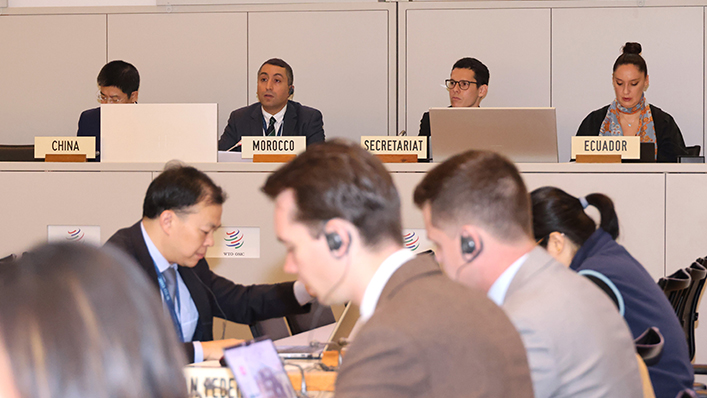
The three issues discussed at the meeting are critical in tackling the challenges of plastics pollution while ensuring trade remains a solution to this global issue. Two other key areas — capacity building for developing members and the potential creation of domestic inventories of trade-related plastic measures — were addressed by participating delegations on 18 September.
Transparency
Delegations examined how to enhance transparency of plastics trade flows, including by supporting the work at the World Customs Organization (WCO), the United Nations Institute for Training and Research (UNITAR) and other relevant institutions. UNITAR updated members on its work to develop statistical guidelines for measuring flows of plastics throughout their life cycle, including estimates for plastics embedded in goods.
A discussion among participants focused on how domestic efforts can contribute to better identifying flows of plastics entering and exiting members’ economies and to what degree they rely on specific breakdowns of Harmonized System (HS) codes. Delegations were asked to provide examples of estimates, data or labelling requirements of average plastics content or plastic material composition in goods used in their respective economies, including for statistical purposes or to support the implementation of Extended Producer Responsibility (EPR), which makes producers responsible for the entire life cycle of their products.
Delegations shared insights on how to improve transparency, monitoring and understanding of trade flows throughout the value chain of plastics, including flows of single-use plastics, plastic film and hard-to-recycle plastics.
Potential best practices
The WTO Secretariat delivered a presentation on technical discussions held at DPP meetings on the efficiency of measures to address plastics pollution, as well as information available in the DPP survey on trade-related plastics measures (TrPMs) regarding existing mechanisms.
The International Institute for Sustainable Development (IISD) presented its paper “Avoiding Trade Concerns in the Design of Plastic Pollution Measures”, which provides insights into aspects of WTO members’ plastics measures that have created friction with trading partners. The paper suggests recommendations for the adoption of suitable policies in the future.
Delegations discussed guidelines and criteria that should be taken into consideration when identifying potential best practices for TrPMs and were asked to provide concrete examples. They also explored whether the voluntary development of domestic inventories of TrPMs could be useful to increase internal coordination, help improve transparency and coherence, and facilitate implementation and trade. Such inventories could also support cooperative and effective trade policies, aligning with actions outlined in the statement adopted at the 13th WTO Ministerial Conference in Abu Dhabi in February 2024.
Access to technologies and services
The discussion on access to technologies and services started with a presentation by UN Trade and Development (UNCTAD) on challenges and opportunities for trade in services for the prevention and mitigation of plastics pollution. This was followed by a presentation by the Forum on Trade, Environment and the SDGs (TESS) on challenges and opportunities for trade in technologies related to plastics pollution. Delegations also benefited from a presentation by the Council on Economic Policies on the Asia-Pacific Economic Cooperation (APEC) Non-Binding Guidelines on Services that Support the Clean-up of Marine Debris.
Several key questions were discussed — for example, the specific technologies and services, including for environmentally sound waste management, which would be particularly useful for addressing plastics pollution from a trade perspective.
Members also discussed the relevant trade policy tools, main trade barriers and challenges for accessing such technologies and services, including for developing members and least developed countries (LDCs). Additionally, delegations addressed what could be done under the DPP to help facilitate access to such technologies and services and to promote cooperation on trade that contributes to ending plastics pollution.
Participants acknowledged that extensive technical work has been done on the three key areas under discussion and considered potential proposals that could be incorporated into the DPP to further these objectives, aiming at producing concrete MC14 outcomes.
Participating delegations agreed that these discussions are pivotal in shaping the agenda for the next Ministerial Conference and ensuring that trade contributes meaningfully to addressing one of the world’s most pressing environmental challenges.
Next meeting
The next DPP meeting will address the following areas: how to support the work at the United Nations Intergovernmental Negotiating Committee (INC) to develop an international legally binding instrument on plastics pollution; how to identify opportunities for greater harmonization, alignment, or interoperability of TrPMs; and how to identify opportunities for enhanced trade cooperation on non-plastic substitutes and alternatives, starting with standards.
Share
Reach us to explore global export and import deals